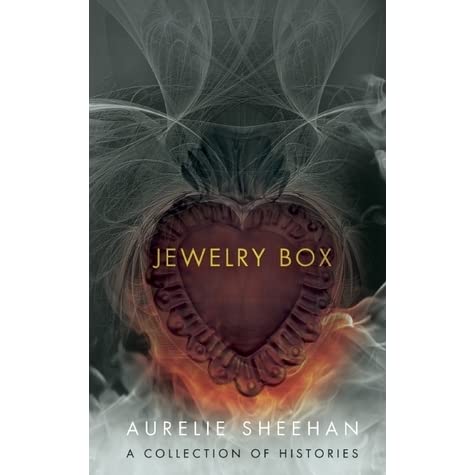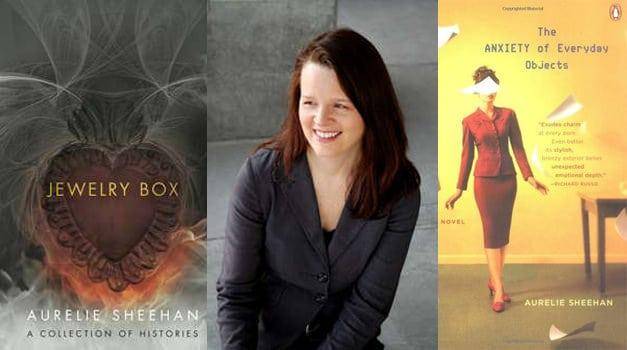Jewelry Box by Aurelie Sheehan
 Aurelie Sheehan is the author of two novels and two collections of short stories—most recently, Jewelry Box: A Collection of Histories (BOA Editions, 2013). Her writing is funny, intimate, and occasionally mordant—like a conversation you wish to be included in. Sheehan has received a Pushcart Prize, a Camargo Fellowship, and the Jack Kerouac Literary Award. She teaches fiction at the University of Arizona in Tucson. You can learn more about her at www.aureliesheehan.com.
Aurelie Sheehan is the author of two novels and two collections of short stories—most recently, Jewelry Box: A Collection of Histories (BOA Editions, 2013). Her writing is funny, intimate, and occasionally mordant—like a conversation you wish to be included in. Sheehan has received a Pushcart Prize, a Camargo Fellowship, and the Jack Kerouac Literary Award. She teaches fiction at the University of Arizona in Tucson. You can learn more about her at www.aureliesheehan.com.
Can you explain the origin of Jewelry Box?
 I wrote Jewelry Box over many years, in rushes of inspiration, in between drafts of two or three novels and longer stories. It began like this: I had just finished a draft of The Anxiety of Everyday Objects [Penguin Books, 2004], and I had a full time job, and I would soon be a mother. I wanted to write, but I had limited time to work with. Also, I was thinking about history: I wanted to find a way into the past and its stories. And so the project was born—a book of histories found within objects and, as the project went on, concepts and states of being. Because I was writing this over so many years, the project encompasses various personal epochs of anxiety, preoccupation, and theme. Finally I homed in on a shape, and published the book with BOA Editions—an amazing literary press, mostly known for poetry, though also recently breaking ground in fiction with their short fiction prize and American Reader Series.
I wrote Jewelry Box over many years, in rushes of inspiration, in between drafts of two or three novels and longer stories. It began like this: I had just finished a draft of The Anxiety of Everyday Objects [Penguin Books, 2004], and I had a full time job, and I would soon be a mother. I wanted to write, but I had limited time to work with. Also, I was thinking about history: I wanted to find a way into the past and its stories. And so the project was born—a book of histories found within objects and, as the project went on, concepts and states of being. Because I was writing this over so many years, the project encompasses various personal epochs of anxiety, preoccupation, and theme. Finally I homed in on a shape, and published the book with BOA Editions—an amazing literary press, mostly known for poetry, though also recently breaking ground in fiction with their short fiction prize and American Reader Series.
Raymond Carver said the great thing about a short story is that you can digest it in one sitting. But with stories of a page (or a paragraph) in length, I was inhaling four or five at a time! Are these stories?
The taxonomy of prose! I have had many great conversations about this very subject in the past couple of years. What’s the difference between a prose poem, say, and a story? What is the story’s truth quotient, and when does it become an essay? I think writers might feel free to allow pieces to define themselves, à la, what is my sexuality? This story feels like a story. This story feels like it’s a story sometimes, but also likes to kiss poetry.
The past weights heavily in Jewelry Box, whether due to nostalgia or lingering trauma. Do certain memories bring you back to a different place?
Because Jewelry Box is a collection of “histories,” it includes pieces set in my own past—it explores the relationship of self to history. In this endeavor, some level of separation from my subject has very frequently helped me find clarity. But I am also exploring the way memory itself “shapes” story—so that’s like looking at the road between self and subject, a kind of middle ground. That isn’t to say I don’t think immersion (and research) can’t be immensely helpful. Sometimes writing in the eye of the storm is the only way.
Some of my favorite stories explore the rituals of femininity. What do you find you’re able to reveal, when you focus on these rites?
 I love how you put that, “rituals of femininity.” I think I can reveal complexity by keeping my eye focused on one thing, one image or object, for longer than might be expected. In “Mascara,” a rather ordinary ritual is delivered in elaborate detail—it’s absurd, lavish, and meditative. Ideally, there is a kind of stop-time effect, an invitation to consider the many perspectives and implications of one thing. In some ways thinking about a really sexy pair of shoes and all it might mean is a perfect example of what I’m trying to do in this whole book. Everything explodes with meaning.
I love how you put that, “rituals of femininity.” I think I can reveal complexity by keeping my eye focused on one thing, one image or object, for longer than might be expected. In “Mascara,” a rather ordinary ritual is delivered in elaborate detail—it’s absurd, lavish, and meditative. Ideally, there is a kind of stop-time effect, an invitation to consider the many perspectives and implications of one thing. In some ways thinking about a really sexy pair of shoes and all it might mean is a perfect example of what I’m trying to do in this whole book. Everything explodes with meaning.
Sexuality is a recurring theme in the collection, whether burgeoning (“Suntan Lotion”) or more fully realized (“Sexual Fantasy”). In such compact pieces, is sexual tension employed to a different effect from a novel, or a longer story?
Sexual tension is cool to think or write about because in a sense it mirrors possibilities within fiction or story. There can be (a) self-consciousness or self-awareness: this is really me here, in mind and body; (b) an interest in communication, in the other: what happens if we collide, talk to each other in this primal way; (c) an overwhelming sense of the present, a pinnacle, obliterating other interests and requirements; and (d) a huge (sometimes) protraction or play with time – what leads up to this moment, what is done with it afterward. Sex = fiction.
Image Credits:
BOA Logo: www.boaeditions.org
Mascara: www.killerlashes.com






